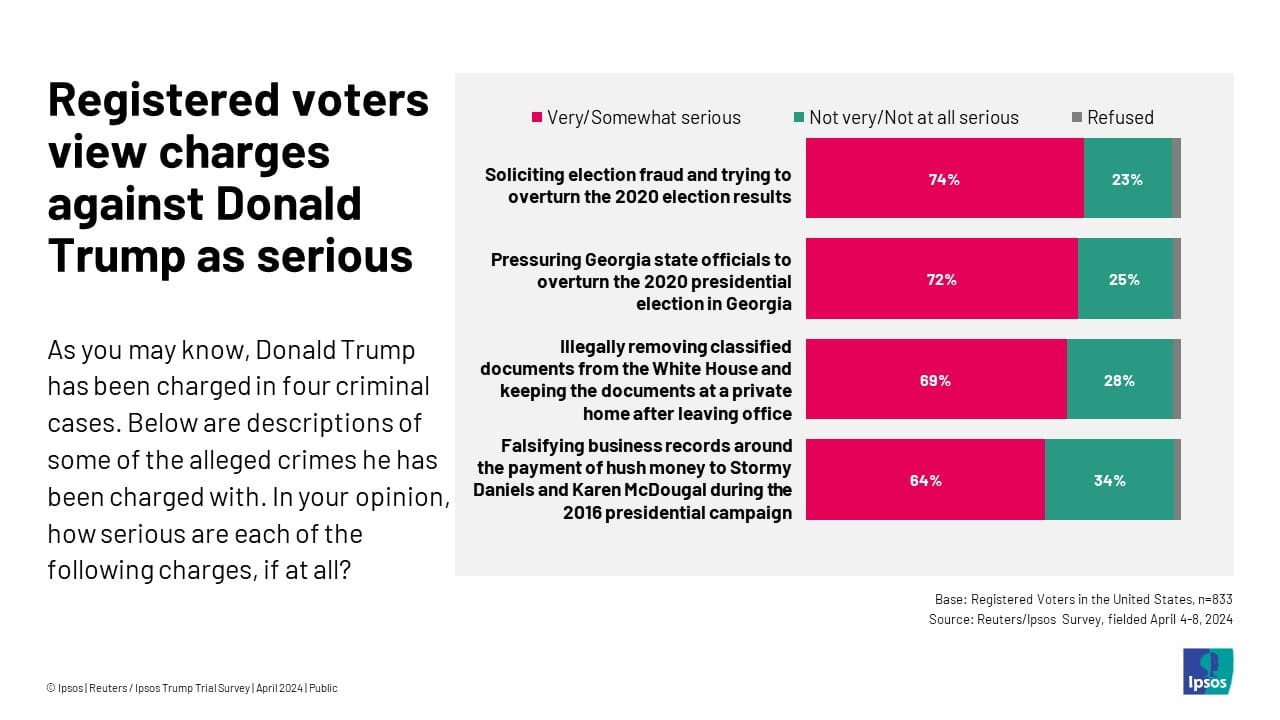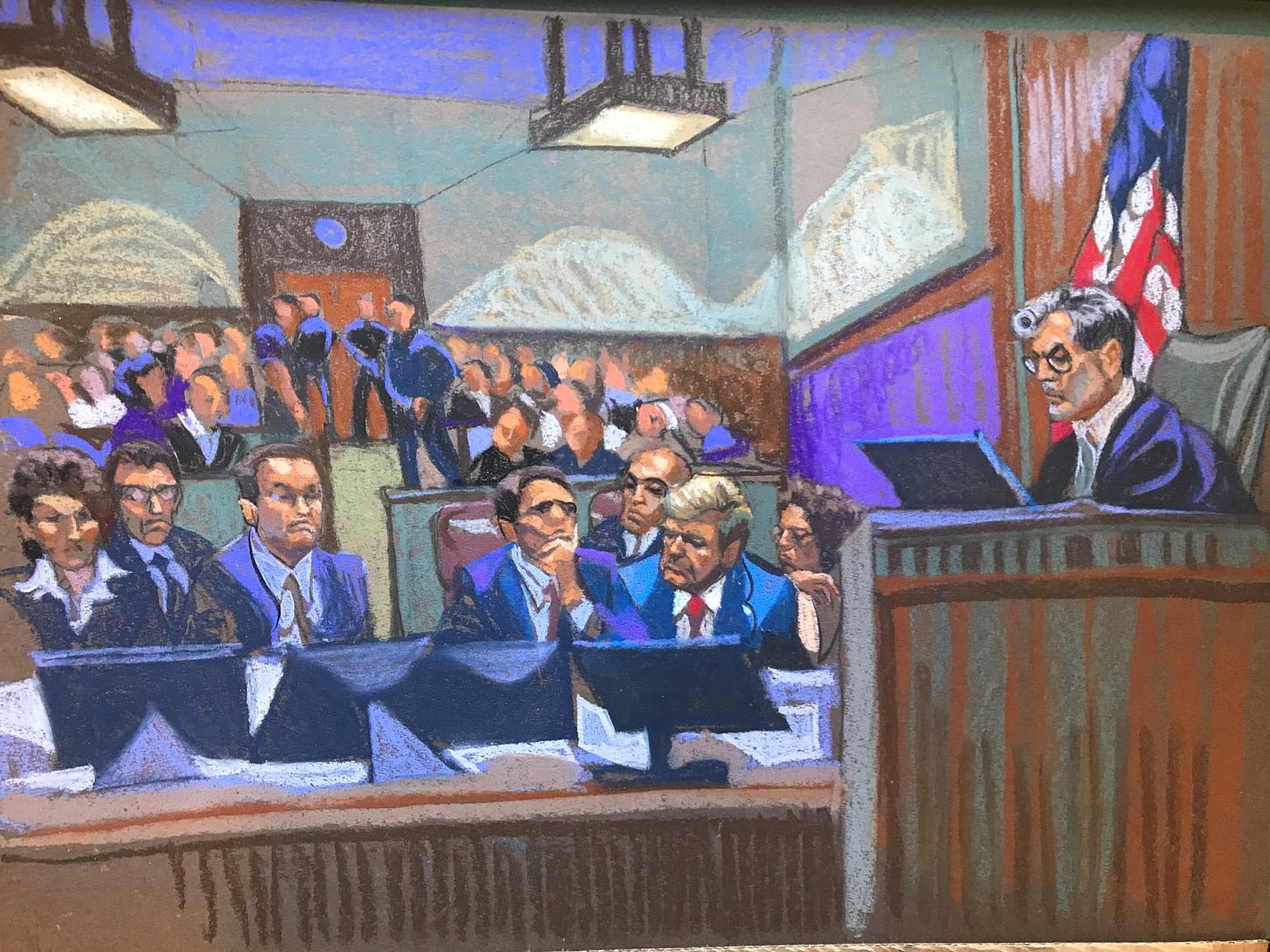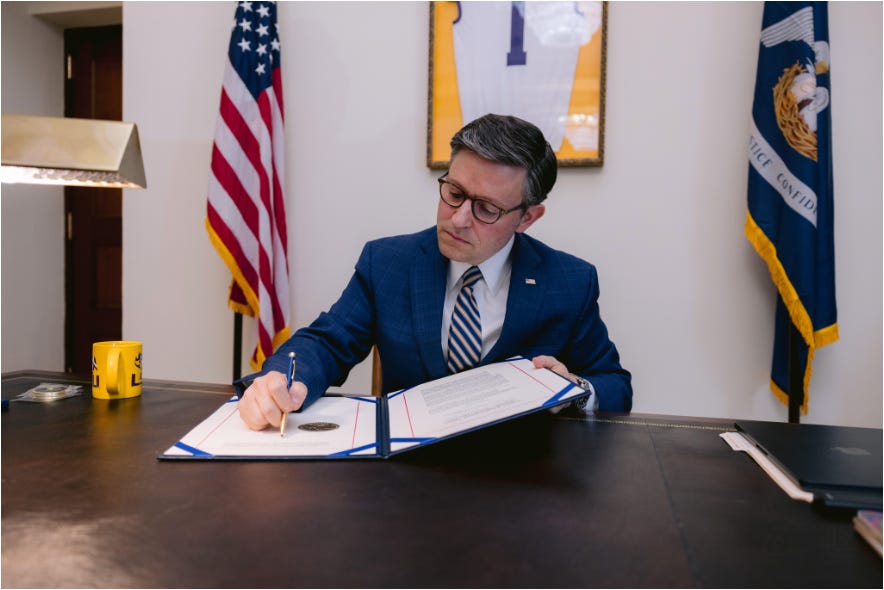January 6th arrives at the Supreme Court
Today’s dispute over an obscure law stemming from the Enron scandal could defang some of the most serious charges against Donald Trump.

Good morning! It’s Tuesday, April 16, 2024. Election Day is 203 days away. If this newsletter was forwarded to you, subscribe here. If you want to contribute to support my work, donate here.
Last call: If you haven’t filled out the reader survey, click here to give me feedback on the newsletter.
Donald Trump currently faces four criminal cases. When you ask experts — and, in polls, American voters — to rank them in order of legal and political importance, the hush money case in New York generally comes out last. That’s the case that went to trial yesterday (more on that later in the newsletter).
In the middle, you generally have the election interference case in Georgia and the federal classified documents case in Florida. Both of those cases have been plagued by delays, sparked by the prosecutor’s personal indiscretions in the former and the judge’s slow movements in the latter.

Then, finally, come the charges most experts name as Trump’s most serious: the federal election interference case in Washington, D.C., his so-called “January 6th indictment.”
While the New York trial continues for Day Two, here in Washington, the Supreme Court will hear arguments today on a case that could upend that last indictment, defanging the charges viewed as the most perilous for the ex-president.
And it all ties back to the 2001 Enron accounting scandal. Allow me to explain:
The path from Enron --> January 6th
Of the 1,387 individuals arrested for actions tied to the January 6th riot, 353 — more than 25% — have been charged with “corruptly obstructing, influencing, or impeding an official proceeding, or attempting to do so,” according to the Justice Department.
That charge comes from the following language in 18 U.S. Code § 1512, which itself is drawn from the bipartisan Sarbanes-Oxley Act of 2002:
(c) Whoever corruptly—
(1) alters, destroys, mutilates, or conceals a record, document, or other object, or attempts to do so, with the intent to impair the object’s integrity or availability for use in an official proceeding; or
(2) otherwise obstructs, influences, or impedes any official proceeding, or attempts to do so,
shall be fined under this title or imprisoned not more than 20 years, or both.
Here’s the Enron connection. The Sarbanes-Oxley Act (also known as the SOX Act) was enacted in response to the 2001 scandal surrounding Enron, in which the energy giant was accused of widespread accounting fraud along with its audit firm Arthur Andersen.
If you read the SOX Act, it’s mainly focused on financial record keeping and reporting. Many of its most important legacies were in that arena, such as requiring CEOs and CFOs to certify the accuracy of their financial information, in order to ensure that top executives can’t separate themselves from the information being reported by their auditors.
Until 2021, prosecutors had only ever charged anyone under paragraph (c)(1) of the above statute, for destroying or concealing documents or records. The Capitol riot was the first time the government invoked paragraph (c)(2), charging defendants for “otherwise” obstructing or impeding an official proceeding.
The dispute in today’s case, Fischer v. United States, hinges on the meaning of “otherwise.”
It was brought by Joseph Fischer, a former Pennsylvania police officer who has been accused by prosecutors of participating in January 6th and attacking law enforcement officers while at the Capitol. (“Can’t vote if they can’t breathe..lol,” Fischer allegedly wrote in a text message before the riot, explaining his desire to take Democratic lawmakers “to the gallows.”)
Fischer’s attorneys argue that paragraphs (c)(1) and (c)(2) of 18 U.S. Code § 1512 are linked by the “otherwise,” which means that prosecutors must prove a connection to the more specific document-related offenses listed in paragraph (c)(1) before charging a defendant with any of the broader offenses imagined by paragraph (c)(2).
“Section 1512(c) is one sentence, and the all-important “or otherwise” clause is the link that connects its two parts—subsections (c)(1) and (c)(2),” Fischer’s lawyers wrote in a brief.
The government pushes back on that more narrow interpretation, arguing that paragraph (c)(2) is meant to expand on paragraph (c)(1), not be constrained by it. “By virtue of its function as a catchall, Section 1512(c)(2) necessarily overlaps with other provisions—but it does not subsume them,” the solicitor general’s office wrote in a brief of their own.
To make their arguments, both sides invoke competing canons of statutory construction, a list of unofficial guidelines judges use to parse legal language. (Here’s a partial list of canons compiled by the late Justice Antonin Scalia.)
In this case, the government is urging the justices to apply the Ordinary Meaning Canon, the principle that judges should use the ordinary, everyday meaning of words in a statute unless they have reason to do otherwise. Using the Oxford English Dictionary definition of “otherwise” (which states that the word means “in a different manner”), the government argues that the word “cannot do the limiting work” that Fischer argues, but is instead a “typical way of introducing a catchall clause that sweeps beyond what came before.”
Fischer, meanwhile, is asking the justices to use the Associated Words Canon, also known in Latin as Noscitur a sociis, which literally means “a word is known by the company it keeps.” His lawyers wrote that paragraph (c)(2) must be considered “in conjunction with the remainder of the” statute, accusing the government of “plucking” the words in the paragraph “from their linguistic and statutory context.”
In addition to the canons of construction, another tool of statutory interpretation often used by judges is consulting a statute’s legislative history. Both sides also invoke legislative history in this case, with Fischer’s lawyers arguing that the SOX Act was meant solely to close the “narrow loophole identified after the Enron and Arthur Anderson accounting scandal” involving document destruction, and the government arguing that it was also intended to “address the larger problem” of obstruction that the scandal “brought to light.”
Of the 16 district court judges who have heard challenges from January 6th defendants against the government’s use of the SOX Act, only one sided with a defendant: Judge Carl Nichols, the Trump appointee who sided with Fischer in this case. The D.C. court of appeals then reversed Fischer in a 2-1 ruling; the Supreme Court agreed to hear Fischer’s appeal of that ruling, which is what brings us to today. This case is the most overtly the court has dipped into the legal fallout of January 6th.
If the Supreme Court sides with Fischer, hundreds of January 6th cases brought under the SOX Act could be thrown out.
Of those, the most high-profile would undoubtedly be Special Counsel Jack Smith’s case against Trump.
Smith’s entire January 6th case does not revolve around 18 U.S. Code § 1512 — of the four D.C. charges the special counsel brought against Trump, only two stem from that statute, so the other two charges would still remain intact. But the dismissal of two charges in his gravest case against Trump would still be a blow to Smith.
Not that Smith will take it lying down. In a footnote buried in a brief last week, Smith hinted to the justices that no matter their decision in Fischer v. United States, he would try to plow ahead with all four of his charges against Trump. How? Smith argued that under either reading of 18 U.S. Code § 1512, his charges against Trump apply, since they involve Trump’s preparation of fraudulent elector slates, which could be considered an attempt to impair a document’s “integrity or availability for use in an official proceeding,” one of the offenses mentioned in paragraph (c)(1).
Smith’s filing was a reminder that the justices won’t go long before they brush against Trump again — and the next time will be even more directly. The brief was sent in response to Trump’s claim that he has absolute presidential immunity from federal charges, a challenge that the Supreme Court is set to hear next Thursday, on April 25.
More news to know.

The first day of jury selection in Donald Trump’s New York criminal trial ended without selecting any jurors. Out of the initial pool of 96 potential jurors, more than half were dismissed after saying they could not be impartial in the case. Justice Juan Merchan was in the middle of questioning the others when the proceedings adjourned on Monday afternoon. Jury selection will continue today and could take several more weeks; it is possible that opening arguments and witness testimony won’t begin in the case until next month.
While no jurors were chosen, Merchan did hand down several other decisions Monday:
He refused to bow to Trump’s request that he recuse from the case.
He said that Trump will have to attend each day of the trial, like other New York criminal defendants. He rejected Trump’s request that he be excused next week to attend the Supreme Court oral arguments over his presidential immunity claims.
He scheduled an April 23 hearing on prosecutors’ request that Trump be held in contempt for allegedly violating a gag order in the case. Trump criticized Michael Cohen and Stormy Daniels on Truth Social last week; on Monday, he shared a video of an ally criticizing Merchan’s wife. Merchan had previously imposed a gag order prohibiting Trump from publicly commenting on likely witnesses, like Cohen and Daniels, or relatives of court members.
He ruled that Karen McDougal, a former Playboy model who claims to have had an affair with Trump, can testify, but that prosecutors can’t tell jurors that Melania Trump was pregnant during their alleged affair.
He ruled that prosecutors can’t play the Trump “Access Hollywood” tape for jurors, but they can read to them from the transcript.
According to the New York Times, Trump sometimes seemed engaged in Monday’s proceedings — but, at other points, appeared to briefly fall asleep, “his mouth going slack and his head drooping onto his chest.”
📜 House Speaker Mike Johnson told Republican lawmakers on Monday that he plans to hold votes this week on three separate bills to fund aid to Israel, Ukraine, and Taiwan, as well as a bill that would combine a TikTok ban with a measure to send seized Russian assets to Ukraine.
⚖️ The Supreme Court allowed Idaho’s ban on gender-affirming care for transgender minors to temporarily take effect.
❓ Justice Clarence Thomas was not present for Supreme Court oral arguments on Monday. The court did not provide any reason for his absence, which it usually does when a justice misses arguments. Thomas, 73, is the oldest sitting justice; Chief Justice John Roberts said he would read the briefs and transcripts in Monday’s cases and still participate in the final decisions.
💸 President Joe Biden and First Lady Jill Biden earned a combined income of $619,976 in 2023, according to tax returns released on Monday. They paid $146,629 in federal income tax, an effective rate of 23.7%, and donated $20,477 to 17 different charities. Vice President Kamala Harris and Second Gentleman Doug Emhoff, meanwhile, earned $450,299, paid an effective federal income tax rate of 19.7%, and contributed $23,026 to charity. Their Republican opponent, Donald Trump, has consistently refused to release his tax returns since entering public life.
☀️ If a presidential candidate and their VP pick are from the same home state, they are prohibited from receiving that state’s electoral votes under the 12th Amendment. Trump has reportedly told associates that, if he picks fellow Floridian Marco Rubio, he would make Rubio move to another state, even though Rubio is a senator from Florida and Trump has residences in two other states.
👎 Robert Kennedy, Jr. claims that he “respectfully declined” an offer from Trump’s “emissaries” to be the ex-president’s 2024 running mate.
💰 In a first for the progressive lawmaker, Alexandria Ocasio-Cortez has donated $260,000 from her war chest to the House Democrats’ campaign arm, the latest twist in her complicated relationship with the Democratic Party establishment.
🗳️ Entrepreneur Jason Palmer, the only candidate besides Biden to win a nominating contest in this year’s Democratic presidential primaries, dropped out and endorsed Biden. Palmer won the caucuses in American Samoa, taking 51 votes to Biden’s 40.
🤔 George Santos’ congressional comeback bid has so far raised $0.
The day ahead.

— President Biden will travel to Scranton, Pennsylvania, where he will participate in two campaign events.
— Vice President Harris will participate in a campaign event in Los Angeles, California.
— The Senate will vote on confirmation of Ramona Villagomez Manglona to be a U.S. district court judge in the Northern Mariana Islands. The chamber is also expected to receive the articles of impeachment against Homeland Security Secretary Alejandro Mayorkas from the House.
— The House is expected to vote on the following bills targeting Iran, following the country’s aerial attack against Israel over the weekend:
A resolution “expressing the sense of the House of Representatives that the slogan, ‘‘from the river to the sea, Palestine will be free’ is antisemitic and its use must be condemned”
— The Supreme Court will hear oral arguments in Fischer v. United States, the January 6th obstruction case.
Before I go...
Here’s a story that stuck with me: This peek into the AI-powered future of the Internet, via the Wall Street Journal.
Jack Brewster writes:
It took me two days, $105 and no expertise whatsoever to launch a fully automated, AI-generated local news site capable of publishing thousands of articles a day—with the partisan news coverage framing of my choice, nearly all rewritten without credit from legitimate news sources. I created a website specifically designed to support one political candidate against another in a real race for the U.S. Senate. And I made it all happen in a matter of hours.
Scary stuff. Click here to read the WSJ piece for free using a gift link.
Thanks for reading.
I get up each morning to write Wake Up To Politics because I’m committed to offering an independent and reliable news source that helps you navigate our political system and understand what’s going on in government.
The newsletter is completely free and ad-free — but if you appreciate the work that goes into it, here’s how you can help:
Donate to support my work or set up a recurring donation (akin to a regular subscription to another news outlet).
Buy some WUTP merchandise to show off your support (and score a cool mug or hoodie in the process!)
Tell your family, friends, and colleagues to sign up at wakeuptopolitics.com. Every forward helps!
If you have any questions or feedback, feel free to email me: my inbox is always open.
Thanks so much for waking up to politics! Have a great day.
— Gabe



